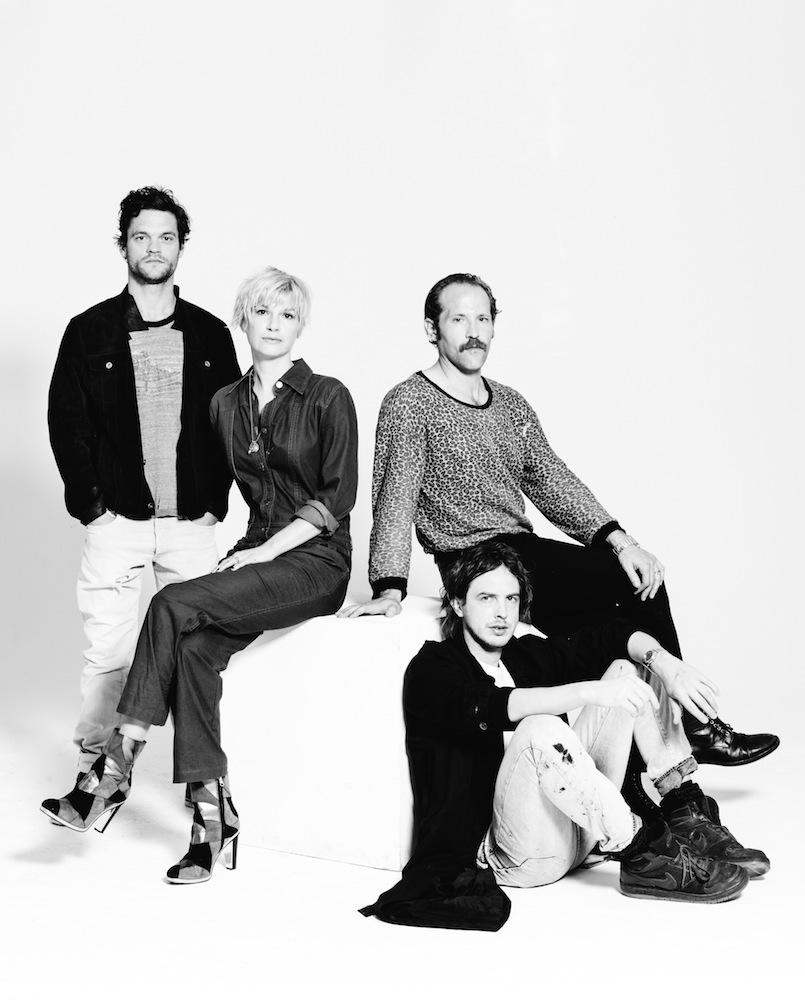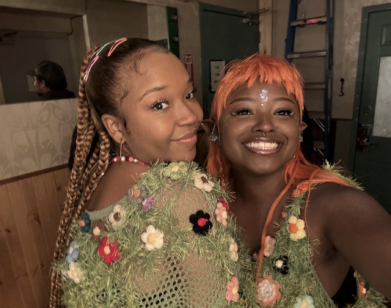BRONCHO Slows Down

BRONCHO IN LOS ANGELES, JUNE 2016. PHOTO: CARA ROBBINS. STYLING: LISA MADONNA. FROM LEFT TO RIGHT: ON NATHAN PRICE: JACKET: SANDRO. SHIRT AND PANTS: TALENT’S OWN. SHOES: LANCIO. ON PENNY PITCHLYNN: JUMPSUIT (VINTAGE): CHANEL. BOOTS: RODARTE & OTHER STORIES. ON BEN KING: SHIRT: TALENT’S OWN. PANTS: LEVI’S. SHOES: MARGIELA. ON RYAN LINDSEY: COAT AND PANTS: TALENT’S OWN. SHIRT: AMERICAN APPAREL. MAKEUP: BLONDIE FOR EXCLUSIVE ARTISTS MANAGEMENT USING ORLANE. GROOMING: CHRISTINE NELLI FOR EXCLUSIVE ARTISTS MANAGEMENT USING CHANEL AND LEONOR GREYL HAIR CARE.
Listeners might quickly recognize BRONCHO’s upbeat, catchy trackS “Class Historian,” used in a commercial with Kate Hudson, or “It’s On,” included in the first episode of Girls Season Three. Released earlier this month, however, the Oklahoma-based band’s third LP, Double Vanity (Dine Alone), marks a shift in musical direction. Frontman Ryan Lindsey employed the same writing process for each new song as those that came before, but unlike 2011’s Can’t Get Past the Lips and 2014’s Just Enough to Be Woman, the new album’s tracks were not sped up during the recording process. The result is a slower, denser, and more cinematic 11-song affair.
While Lindsey and bandmates Nathan Price, Ben King, and Penny Pitchlynn have previously opened for a range of acts, including Billy Idol, Cage the Elephant, and Social Distortion, they are currently on a headlining North American tour. Tonight, BRONCHO is playing New York’s iconic Bowery Ballroom, so before they arrived we spoke with Lindsey over the phone.
EMILY MCDERMOTT: Where are you at the moment?
RYAN LINDSEY: We’re driving through Wyoming to Denver for a show tonight. We played Salt Lake City last night. We drove three hours last night after the show to make it a little bit more reasonable today.
MCDERMOTT: What do you do to pass the time?
LINDSEY: I’ll listen to podcasts, radio shows. I like listening to talking. I listen to Rachel Maddow a lot. She’s my personal professor, I feel like I’m taking a class. She’ll give you a little history lesson and then bring it to a current event. It explains why something that’s going on actually matters, but might not be getting much attention. I enjoy that. I feel like I’m sitting in class. I’m currently listening to last week’s Real Time with Bill Maher. Those are entertaining, but you also learn something. He has different people on his roundtables, so you’re getting different points of view.
The other thing I listen to a lot is a thunderstorm app on my phone. I’ll put my headphones on and listen to a rainstorm on a loop. It’s peaceful; it filters out any noise, so I can concentrate. Being in a van with people, it’s nice to find some seclusion. But at the same time, it’s nice to have people around that you like—and I love everybody in this crew.
MCDERMOTT: Moving to the album, BRONCHO’s sound has become a bit slower with every release, but with this one really took a chill pill, so to speak. What led you toward the slower sound?
LINDSEY: The main thing was that these songs don’t make as much sense, or feel as good, faster. When I write, typically it’s slow. I play it and sing it really slowly, but then the songs made more sense when we sped them up. On this record, I was playing them slow, but when we started recording, they only made sense that slow. The songs made more sense in the [slower] tempos. So it’s partly that and it’s partly wanting to do something different than what we did in the past, not continue down the same path. That was more in the subconscious; it wasn’t necessarily anything that we talked about, but that has to be part of it. That’s the type of people we are. We like to mix it up.
MCDERMOTT: In another interview you’ve done, you spoke about “Jenny Loves Jenae” and said that sometimes you like taking breaks from ambiguity to tell a story. Can you tell me where the stories come from?
LINDSEY: “Jenny Loves Jenae” just kind of appeared. It wasn’t about anyone in particular. It’s the sweetest song that BRONCHO could do—a real love story. It could be about plenty of people I know, but we weren’t specifically talking about anybody.
It’s hard to understand what I’m saying on “I Know You,” [laughs] but reading the lyrics, that one is pretty straightforward, about relationships. It’s almost as true as “Jenny Loves Jenae,” but not quite. It’s not as ambiguous as the others for sure.
MCDERMOTT: Once you finish the musical elements of a song, what is the process for starting the lyrics?
LINDSEY: When I write a song, it comes from melody, from me singing and working with a melody in my head. Certain words start to come out. Lyrically, everything is a chance at a certain point. It starts off by chance that something is coming to mind. From there, we start to figure out a meaning. We let the melody dictate certain things. I feel like it’s more natural, rather than me trying to write words and fit it into a cadence. Proper English is never on our minds when we’re trying to cram stuff in. I can’t remember the quote, but there’s a Warren Zevon interview about rules and songwriting. He’s essentially saying that each song has its own rule. There is not a set of guidelines when it comes to English for a songwriter. That always stuck with me, it always made me feel comfortable, because I’ve always felt that way.
MCDERMOTT: Can you also tell me where the name of the album, Double Vanity, comes from?
LINDSEY: At Habitat for Humanity you can buy cheap supplies for building houses or doing construction. You can get anything that you would need in a house and it’s cheaper because it’s donated. I was going to one of those, because you can find good electronics—old tape decks, record players—but there was this double vanity sink leaning against the wall. It was pink and looked amazing. “Double vanity” stuck in my mind, stuck around through the whole record process. By the end, it made the most sense. On this record, we’re talking, sometimes facetiously, about relationships and making light of certain aspects of love, but ultimately it is about love and what’s better than a double vanity? His and hers, his and his, hers and hers—there’s two sinks, there’s two places to go, there’s two ways, there’s two options. It made a lot of sense for us and our songs. We always have a couple ways out, meaning-wise—a couple points of view.
MCDERMOTT: I also really love the album artwork. Did you design it?
LINDSEY: Yeah, we started renting this warehouse that used to make Jacuzzis and the floor is a total mess. It looks kind of like a high-desert, mountain terrain. We knew we wanted to use it for videos, or make miniatures for some type of action scene. But we knew that we needed some artwork, so we found this coffee table that had triangle mirrors, set those up, and took a bunch of pictures. Our friend helped pick the best of the photographs. There’s a lot of mirrors when it comes to vanity—if you’re talking about being vain or if you’re talking about an actual bathroom vanity.
MCDERMOTT: I definitely through the mirror triangles were superimposed via Photoshop or something.
LINDSEY: No, there’s zero Photoshop. That’s kind of the best part about it, it just made sense. We got lucky.
MCDERMOTT: I read that you host shows at the warehouse, too. How did you find this place?
LINDSEY: We were looking for a warehouse and checked out a couple places, but everything was expensive. Down the road from Nathan’s is this big industrial area, right by the river. There was a place for lease and it was mega cheap. We went to look at it and it was like that scene in Ghostbusters where they go in and it’s a total mess but perfect. We knew we needed the spot. The people that made the Jacuzzis left all of their stuff. It was like, “They didn’t want to deal with it so you take it all.” There are giant tables they would put casts on; we turned those into stages. We started rehearsing for this new record and then started turning it into a show. Once we get back, we’ll keep throwing shows like that. It’s a fun little party. We’d love to only play there.
MCDERMOTT: BRONCHO was initially born out of a film project, and now you’ve had songs featured in soundtracks. What role does film play in your life?
LINDSEY: I love watching movies. We grew up in an era of home video. Soundtracks, for sure, have influenced my life. We all think cinematically, without necessarily talking about it. We like drama, we like the dramatic. I think this record is more cinematic than the previous ones because of the slowness. It’s a lot moodier, which I think works more with films—hopefully it does because hat’s the way people get paid these days. [laughs] As long as we can get paid enough to keep our warehouse, we’ll be okay. That’s all we want, the Jacuzzi house.
MCDERMOTT: Do you have any Jacuzzis at the Jacuzzi house?
LINDSEY: Yeah, totally. They left several and they left the casts. So we could, if we wanted to, go in business .We could probably start making Jacuzzis, get people in some tubs. [both laugh]
MCDERMOTT: I’m now envisioning you playing a show with people sitting around, hanging out in Jacuzzis.
LINDSEY: We brought a bunch out when we played our last show there. We were like, “People can stand on these if they want to see over people,” and they really work. It’s like stadium seating, in its own way.
MCDERMOTT: How many people come out to the shows?
LINDSEY: The last one was a couple-hundred people. At one show, we played through the whole new record. Then, it gets really foggy, but we started playing old songs. Somebody said that at one point all four of us were playing four different songs. Our friend got on the microphone like, “Hey you guys should probably stop.” Then, at three or four in the morning, we went back and played the whole set again. That’s the type of show we like playing—if we can keep our stuff setup, we’ll play again. People show up late, they might want to see the show. That’s the beauty of having your own private little theater.
MCDERMOTT: I’m not going to ask about the people you’ve toured with, but when someone once asked about your tour with Billy Idol, you said “I really hope to get a solid Billy hang.” Did you ever get that solid Billy hang?
LINDSEY: Yeah, we hung out in Montreal, I had a really good convo with him. He said, “The news is in: We make a great fit!” It was the best endorsement I could have gotten. The way he navigates the whole system—he’s always on and that’s really fun to see. Even backstage, you never saw him act like anything was more serious than what was going on. He’s serious about playing the show, but you don’t see him treating people like they’re any different. He’s there and he’s Billy, and I think that’s what we try to be too. There’s a lot of people working to make something happen and that’s as serious as it should be. They had a really good attitude about that, and it was good for people like us to see it. Billy’s the man.
BRONCHO IS PLAYING TONIGHT AT BOWERY BALLROOM IN NEW YORK. FOR MORE, VISIT THE BAND’S WEBSITE.






